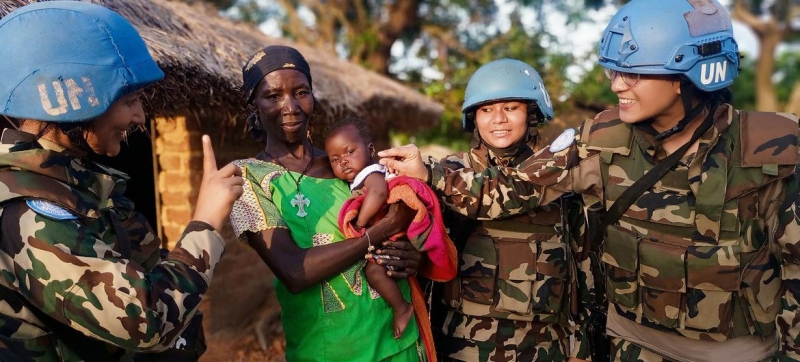
Women UN peacekeepers with local residents in the Central African Republic. UN forced to cut peacekeeping missions due to funding crisis Peace and Security
Serious funding shortfalls threaten to cripple UN peacekeeping operations around the world. The organization warns that due to delays in the payment of contributions from member states, it will have to reduce the number of patrols, close field offices and repatriate thousands of blue helmets.
As Under-Secretary-General for Peace Operations Jean-Pierre Lacroix noted, the current crisis is “more serious than ever before” and is caused by partial non-payment of assessed contributions – mandatory payments that member states make to fund the UN’s work in the world’s most fragile regions. These revenues remain well below the approved budget for 2025-2026.
This week, speaking to military officials and diplomats at a peace conference in New Delhi, Lacroix again warned of the consequences of such a situation and said that the lives of hundreds of thousands of civilians depend on the work of peacekeepers faces.
Large reductions
The UN Secretary-General has directed all missions to develop cost reductions of 15 percent of their annual budgets. This will result in an approximately 25 percent reduction in the number of military and civilian personnel. These measures will affect all key areas of peacekeeping missions, from patrol and civilian protection to logistics, aviation and administrative support.
The Department of Peacekeeping Operations warns that fewer peacekeepers on the ground means fewer patrols to monitor ceasefires, fewer safe zones for civilians, and less support for humanitarian operations in places like the Democratic Republic of the Congo, South Sudan, the Central African Republic, Lebanon, and the Golan Heights.
Call for solidarity
Jean-Pierre Lacroix called on all member states to pay their dues “in full and on time” and to present a united front against “campaigns of misinformation and disinformation about peacekeeping operations.” and police personnel for peacekeeping missions, also called for stable funding, stressing that without this, UN peacekeeping operations will not be able to fulfill the mandates assigned by the Security Council.
Prevention confrontation
The General Assembly in July approved a peacekeeping budget for 2025-2026 of $5.38 billion, down slightly from $5.6 billion the previous year. This budget covers missions and global support centers in Entebbe, Uganda and Brindisi, Italy.
However, implementation of the plans depends on countries providing these funds.
Peacekeeping accounts for less than half a percent of global military spending, estimated at $2.7 trillion in 2024, but remains one of the UN’s most significant tools for maintaining international peace and security.
“Some people ask why peacekeeping missions are still needed,” Colin Stewart, the former head of the UN Peacekeeping Force in Cyprus, said in an interview with the UN News Service shortly before his retirement. – The answer is simple: peace is maintained precisely because the missions do their job. Without them, mistrust between the parties can easily escalate into confrontation.”
The Decisive Moment
Since 1948, more than two million peacekeepers from around the world have served in the most dangerous environments, helping to implement ceasefires and creating space for political dialogue and peace processes. More than 4,400 peacekeepers have died in the line of duty.
As Jean-Pierre Lacroix says, in its 80th anniversary year, the UN is “at a turning point” and must adapt its peacekeeping operations to the new global realities.
“The tests that await us are real,” he noted. “But our ability to overcome them is just as real – if we remain united in our goals, pragmatic in our actions and unwavering in our commitment to peace.”
